Where We Work
See our interactive map


High level government officials and participants at a workshop for improving quality of training. Photo by Rayan Sharif for IntraHealth International.
How we’re changing approaches in health training centers to increase client satisfaction and service quality.
A little over three years ago, I began hearing about USAID’s Accelerating Universal Access to Family Planning Project in Bangladesh. The project—named Shukhi Jibon, which means “happy life” in Bengali—focuses on developing the family planning workforce and contributes to the health and well-being of Bangladeshis by increasing their use of family planning services.
Shukhi Jibon, I knew, could make a big difference in Bangladesh. For family planning providers, it could help improve health workers’ skills and confidence. For the government and training institutes, the project could improve the quality, efficiency, and performance of family planning services and increase client satisfaction.
Throughout my career, I had worked passionately to improve sexual and reproductive health, family planning, and maternal and child health. If Shukhi Jibon were successful, its benefits would filter beyond family planning to other areas of the health system. So, when the chance to join the project presented itself, I seized the opportunity.
Family planning in Bangladesh has come a long way, but progress has plateaued in the last decade and regional disparities remain. In response, the government began focusing on universal health coverage, including reproductive health services, and made health workforce development a priority.
Putting health workers at the center of the solution was essential.
Putting health workers at the center of the solution was essential. Happy, satisfied clients are more likely to continue to communicate with their providers and encourage friends and family to seek care as well. But to achieve this kind of multiplier effect in family planning—essentially,
to ensure people who need it most receive the best services and solutions—every health worker must be highly skilled and confident in the services they provide.Key findings from a training needs assessment we conducted at the beginning of Shukhi Jibon showed us that more than 90% of health facilities in Bangladesh provided family planning services, yet only 57% of clinics had staff who were trained in family planning. Even among those who had been trained, many lacked confidence in their skills. And despite health workers’ obvious skills and confidence gaps, survey respondents also repeatedly questioned the value of trainings. It was apparent that there was a sense of fatigue and perception that the trainings weren’t useful, partly because the trainings were mostly lecture-based and lacked interaction and practicum opportunities.
Shukhi Jibon is led by Pathfinder International, in partnership with lntraHealth International, and in collaboration with the Directorate General for Family Planning, Directorate General of Health Services, and the National Institute of Population Research and Training in the Bangladesh Ministry of Health and Family Welfare.
We knew we needed to change how trainings were conducted and managed.
As collaborators, we knew our solutions needed to address not just the skills and confidence gap, but fundamentally change how trainings were conducted and managed. So we introduced adult learning best practices into curriculum development, trainings, and delivery, and addressed system needs in an efficient, cost-effective way. Some of the approaches and systems we implemented included:
Managers and heads of training institutes, meanwhile, who previously made decisions ad hoc, are using data from TMIS along with the processes and information derived from OPQ and IC for data-driven decision-making.
We’ve trained trainers from the National Institute of Population Research and Training, Directorate General for Family Planning, Directorate General of Health Services, and other government agencies on CBT and they are now providing training themselves, which has the potential to benefit other types of health worker training.
Shukhi Jibon has also been collaborating closely with other nonprofit partners to ensure cohesion across projects. We supported CBT integration and adult learning into postpartum family planning and maternal and child health trainings led by other nonprofits.
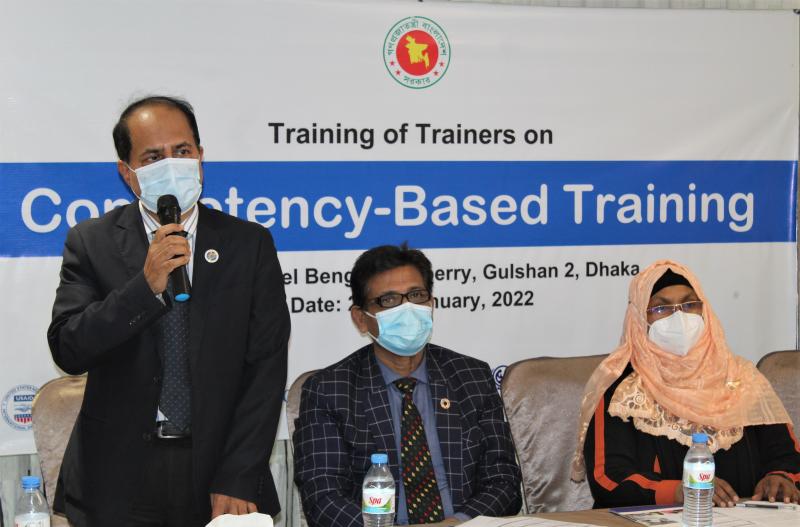
Government officials from the Ministry of Health and Family Welfare, National Institute of Population Research and Training, and Directorate General of Family Planning at a training program. Photo Taken by Mahbubur Rashid for IntraHealth International.
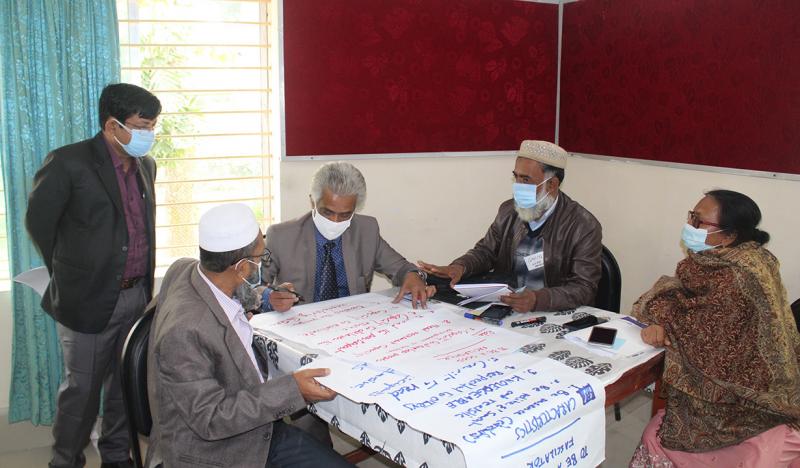
A small group convenes with a trainer to review competency-based training. Photo Taken by Mahbubur Rashid for IntraHealth International.
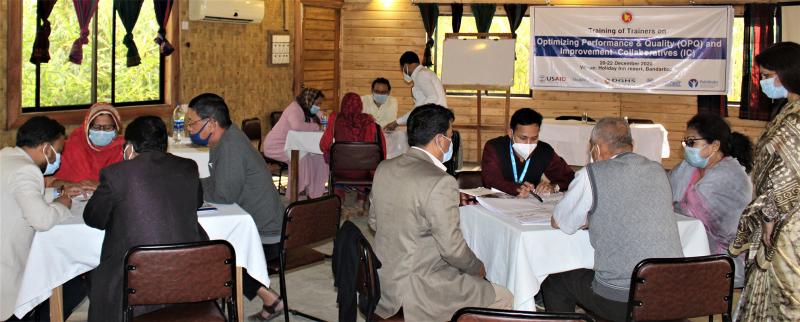
A training of trainers session on the optimizing performance quality approach and improvement collaboratives. Photo Taken by Mahbubur Rashid for IntraHealth International.
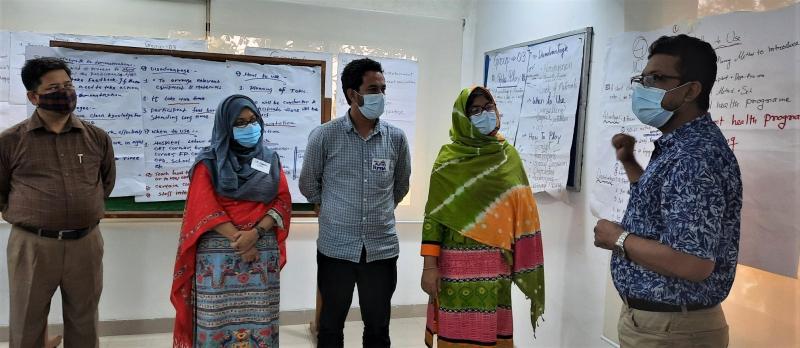
Sessions conducted by a trained trainer on competency-based training. Photo taken by Mahbubur Rashid for IntraHealth International.
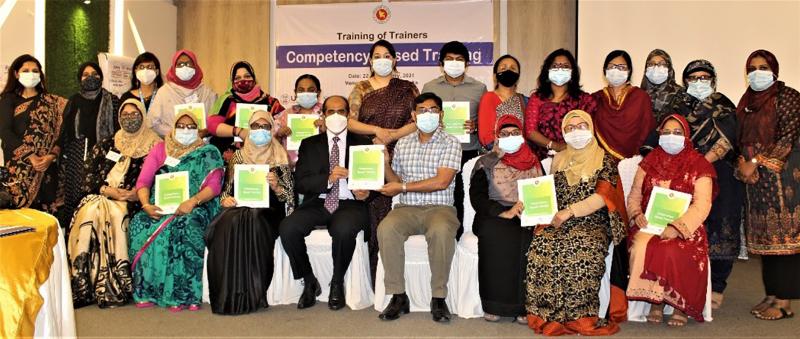
High level government officials and trained trainers with the trainers’ manual on competency-based training. Photo taken by Rayan Sharif for IntraHealth International.
In our early days, we really struggled to get people to see and understand the value of CBT and TMIS. Government officials were reluctant to change. To them, what Shukhi Jibon was offering had already been done.
Once we began our training of trainers and demonstrated the impact of CBT approaches, those same government officials started paying attention, some even asking why they didn’t get this kind of training earlier. That’s when we knew we were making progress. After that, in each district we’ve worked, we’ve called on some of these converted officials, and they’ve become our best advocates.
We have always put relationship-building first.
So what’s been central to our success thus far? We have always put relationship-building first. And we prioritize transparency. By our actions and interactions, we’ve slowly won people over.
We’ve laid the groundwork and now it’s time to strive for sustainability and move toward strategy and policymaking. We would like to see our programs included in the next sector plan as well as in the National Institute of Population Research and Training and Directorate General for Family Planning operational plans. Then, the government will own the programs, and we can transfer Shukhi Jibon to the National Institute of Population Research and Training.
Once the Shukhi Jibon project is complete, we will see competency-based training integrated into Bangladesh’s health worker training system and training organizations can start to focus on building trainer techniques. Our dream is that health workers will be able to provide high-quality family planning services and follow standards that will keep their clients coming back.
Accelerating Universal Access to Family Planning is funded by the US Agency for International Development. IntraHealth International is a supporting partner for Pathfinder International.
Want to get more content like this delivered to your inbox? Sign up for our mailing list.
Get the latest updates from the blog and eNews




